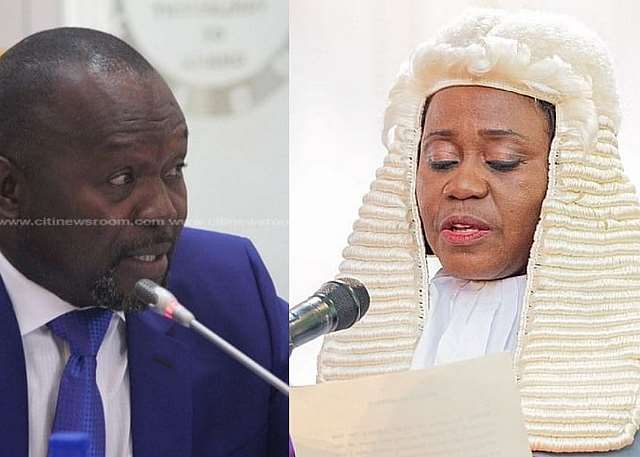
The Attorney General (AG) has fired back at suspended Chief Justice, Gertrude Sackey Torkornoo, denying allegations of leaking processes seeking her removal from office.
In a sworn affidavit in opposition to the suspended CJ affidavit in support of her motion for interlocutory injunction, the AG accused the Chief Justice of consistently publishing the processes to the public, contrary to constitutional injunction.
In a significant development in the ongoing removal proceedings of the Chief Justice, the Attorney-General vehemently denied allegations of leaking processes related to the case to the public.
The Attorney-General’s office has responded to the applicant’s affidavit, specifically addressing paragraphs 17 through 23.
The AG asserts that holding proceedings in camera is a constitutional requirement aimed at preserving the dignity of the applicant, the judiciary’s authority and independence, and protecting potential witnesses.
Furthermore, the AG argues that while the applicant may waive her rights to in-camera hearings, she cannot unilaterally waive the rights of the entire judiciary or potential witnesses who are also entitled to protection.
Regarding the applicant’s claims of not receiving proper records of consultative proceedings between the Council of State and the President, the AG states that the true and proper records have been supplied to those entitled by law.
The AG also notes that the Supreme Court recently ruled in a similar case (Centre for Citizenship Constitutional and Electoral Systems LBG v The Attorney-General & 2 Others) that the applicant’s claims do not warrant an order of interlocutory injunction.
The case continues to unfold, with the AG maintaining that the applicant’s assertions are unfounded and that constitutional safeguards must be upheld to protect the integrity of the judiciary.
Below are excepts of AG affidavit in opposition
- That in respect of the allegations (in Paragraph 17 of the affidavit in support of the motion) of leakages of the processes in the removal proceedings to the public, the Attorney-General denies ever leaking any such processes; and states that the only person who, contrary to express constitutional injunction, has consistently published the processes to the public is the Applicant.
- That the Attorney-General denies the depositions in Paragraphs 18 and 19 of the affidavit in support of the motion; and states that the requirement that the proceedings be held in camera is a constitutional command which, by your Lordships’ reasoning in case law, is meant to preserve, protect and safeguard not only the dignity of the Applicant, but also the dignity, authority and independence of the entire judiciary, and to, also, protect potential witnesses from some forms of recrimination.
- That in further response to the depositions in Paragraphs 18 and 19 of the affidavit in support of the motion, the Attorney-General states that while the Applicant may be entitled to waive her rights (if any) to the protection and safeguards offered by the in camera hearing, the Applicant, being just one member of the constituents who are offered this safeguards and protection, is not in any way entitled to and, therefore, cannot waive such right to such protection or safeguards for the entire judiciary or potential witnesses in the matter.
- That the Attorney-General denies the depositions in Paragraphs 20, 21, 22, and 23 of the affidavit in support of the motion; and states that the true and proper record of the consultative or advisory proceedings between the Council of State and the President on the three petitions (for the removal of the Applicant from the office of the Chief Justice) has been duly supplied to the persons who are, by law, entitled to be supplied.
- That in further response to the Applicant’s depositions in Paragraphs 20, 21, 22, and 23 of the affidavit in support of the motion, I am advised and I verily believe the same to be true that, by law, the appropriate remedy for not receiving a document or a process which the Applicant believes to be entitled is not an order of interlocutory injunction.
- That in additional response to the Applicant’s depositions in Paragraphs 20, 21, 22, and 23 of the affidavit in support of the motion, the Attorney-General states that this honourable Court has already, on May 21, 2025, in the case of Centre for Citizenship Constitutional and Electoral Systems LBG v The Attorney- General & 2 Others (Suit number J8/106/2025, Supreme Court ruling dated May 21, 2024) summarily dismissed the Applicant’s claims in the named Paragraphs as an insufficient basis for a grant of an order of interlocutory injunction in the circumstances of the present matter
By Mutala Inusah







